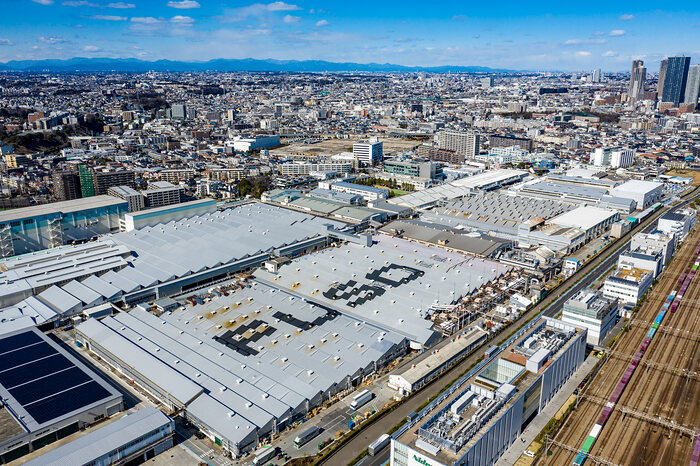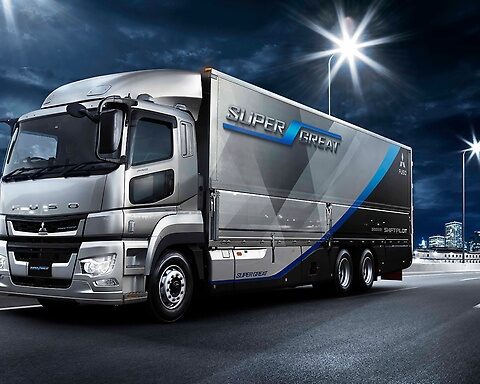Kawasaki, Japan – President and CEO: Hartmut Schick) is proud to announce that MFTBC will be following the Daimler Trucks & Buses ambition towards CO2-neutrality in production sites by aiming to shift all plants to CO2-neutrality by 2039. Operations at Mitsubishi Fuso Truck Europe S.A. (MFTE; Head office: Tramagal, Portugal), MFTBC’s wholly-owned subsidiary in Portugal, will become CO2-neutral already within 2022. Other plants in Japan will follow to achieve CO2-neutrality by 2039 at the latest. MFTBC’s Kawasaki and Nakatsu Plants have reduced CO2 emissions by 17% since 2015.
In these past few years, communities everywhere have been rapidly accelerating their efforts toward decarbonization and carbon neutrality. The Japanese government, for example, stated that it would “aim to become carbon neutral [in the automotive industry,] including the entire supply chain” in their action plan for the Green Growth Strategy, which was approved by the cabinet in June 2021.
Amidst these developments, MFTBC follows the Daimler Trucks & Buses target to offer only new vehicles that are CO2-neutral in driving operations (“tank-to-wheel”) in Europe, Japan and North America by 2039. Daimler Truck AG aims to accomplish this goal by electrifying its vehicles and is following a dual-track strategy to this end. As early as 2022, Daimler Trucks & Buses wants its vehicle portfolio to include series-produced vehicles with battery-powered drive systems in the main sales regions of Europe, the United States and Japan. Beginning in 2027, the company wants to supplement its vehicle portfolio by adding series-produced hydrogen-powered fuel cell vehicles. The ultimate goal is to achieve CO2-neutral transport on the road by 2050.
In addition to these targets for its products, Daimler Truck AG is also committed to sustainability in other aspects of the value chain, including the production process. All European Daimler Trucks & Buses plants will have a CO2-neutral energy supply by 2022.
Tramagal Plant to achieve carbon neutrality by 2022
MFTE has announced that its Tramagal plant in Portugal is setting the course for sustainable truck production by achieving carbon neutrality by the end of 2022. The Tramagal plant is currently the center of production for the FUSO light-duty Canter and all-electric eCanter trucks in Europe.
Initiatives at the Tramagal plant include:
- Contracting green electricity, increasing on-site solar power production and switching to self-consumption
- The entire internal logistics and warehouse fleet is being converted to electric vehicles
- The plant will also be exploring the possibilities of green hydrogen production with the support of solar panels, to gradually replace natural gas consumption
In recent years, the Tramagal plant was able to progressively reduce CO2 emissions and is expecting a further 50% cut in 2021 compared to the previous year before achieving CO2-neutral production in 2022.
MFTBC production on track for 2039 – Kawasaki and Nakatsu CO2 emissions reduced by 17%
Three other MFTBC plants located in Japan – Kawasaki, Toyama and Nakatsu – will follow Tramagal and aim to become CO2-neutral by 2039 at the latest.
At the Kawasaki Plant, where MFTBC’s headquarters are also located, and the Nakatsu Plant, where transmissions are manufactured, MFTBC implemented a 5-year plan to decrease CO2 emissions by 17% compared to 2015 levels. Building on this track record, MFTBC has created a new roadmap to decarbonize the Kawasaki Plant by 2039. Other facilities crucial to the MFTBC production network, including the bus manufacturing plant in Toyama, as well as the Nakatsu Plant, will also be in scope under the 2039 target.
The plan defines several key methods as follows:
- Energy Saving: reduction of energy consumption in production areas by reducing demand and introducing energy-saving equipment.
- Renewable Energy Generation: reducing CO2 consumption by generating renewable energy
- In 2013 and 2014, solar photovoltaics (PVs) were installed on the roofs of buildings in the Kawasaki Plant
- Installation of additional solar PVs is planned for the near future
- Integration of other energy sources like hydrogen is also under consideration
- Green energy purchase and CO2 emissions factor reduction, in collaboration with electric companies
- CO2 Certification
MFTBC has also started researching possible ways to reduce CO2 in its production process. For example, MFTBC is evaluating the possibility of reducing CO2 and volatile organic compounds (VOC) emitted in vehicle painting by relying more on other surface treatments.
MFTBC will also pursue carbon neutrality across the value chain
In addition to production areas, MFTBC is also looking at other aspects of the vehicle value chain. At each stage, we have started considering possible ways to reduce and eliminate CO2 emissions, some of which have already been implemented.
Logistics is another area to which MFTBC is turning its attention to promote reduced CO2 emissions across the value chain. MFTBC has started evaluating methods of quantifying carbon emissions that occur both when receiving materials and components from our suppliers, and delivering our products to customers. In these areas, MFTBC is already proceeding with the following countermeasures:
- reducing CO2 emissions from deliveries, by revising the number of trucks to deliver components and products; optimizing modes of transport; adjusting cargo utilization and routes
- installing electric forklifts that emit less CO2 for internal logistics
MFTBC is creating a carbon neutrality roadmap for its logistics operations and will soon expand these areas of effort.
For procurement at MFTBC, sustainability has already been one aspect considered as part of the supplier evaluation process, in line with the Daimler Supplier Sustainability Standards and the Daimler Trucks procurement guidelines. As part of Daimler Trucks, MFTBC promotes climate protection and sustainability among our suppliers and sets impulses to pursue high standards both within their companies and in their own supply chains.
An example of this effort is the CDP Climate Protection Survey. To create more transparency about the environmental impact of our supply chains, Daimler Trucks works with organizations such as CDP (formerly the Carbon Disclosure Project). In 2020, key suppliers were invited to participate in an annual survey to report their environmental impact, including their level of CO2 emissions. Until now, suppliers representing more than 70% of the annual purchasing volume of the Daimler Truck and Bus business have been asked to participate, with the scope expected to increase in 2021 and support the effort to reduce CO2 emissions throughout the automotive supply chain.
Other initiatives include the promotion of climate protection and sustainability among suppliers through the annual, Daimler-wide Sustainability Award. This award has been presented across all divisions since 2019, to recognize suppliers who stand out in their commitment in the areas of climate protection and resource conservation.
MFTBC will not wait until 2039, nor go it alone
While MFTBC has set 2039 as our target year, we are committed to becoming CO2-neutral as early as possible. As the Tramagal Plant and other Daimler Trucks & Buses production facilities in Europe remain on track toward achieving carbon neutrality by 2022, the learnings from these locations will aid in accelerating the MFTBC’s efforts to reduce its global environmental impact. Moreover, by extending its own initiatives to other entities within the group, MFTBC will further contribute to Daimler Trucks & Buses’ aims for carbon neutrality.
Hartmut Schick, President and CEO of MFTBC, states, “Climate change is a topic that needs to be addressed and solved worldwide. Therefore, the electrification of commercial vehicles cannot be achieved by manufacturers and customers alone. Inter-industry alignment and governmental support will also be vital in establishing effective transformations throughout logistics and the supply chain. Collaborative actions between public and private sectors are essential to succeed in this major challenge.”
MFTBC at a Glance
Based in Kawasaki, Japan, Mitsubishi Fuso Truck and Bus Corporation (MFTBC) is one of Asia’s leading commercial vehicle manufacturers, with 89.29% of its shares owned by Daimler Truck AG and 10.71% by various Mitsubishi group companies. An icon in the Japanese commercial vehicle industry with a longstanding history of more than 85 years with its FUSO brand, MFTBC manufactures a range of commercial vehicles including light, medium, and heavy-duty trucks and buses, and industrial engines for over 170 markets worldwide. In 2017, MFTBC introduced the eCanter, the pioneering all-electric light-duty truck, and in 2019, the Super Great – Japan’s first heavy-duty truck fitted with Level 2 Automated Driving Support Technology, a benchmark in the Japanese commercial vehicle market. MFTBC operates under the umbrella of Daimler Trucks Asia, together with its partner organization Daimler India Commercial Vehicles (DICV) in India. This strategic unit allows the entities to collaborate on areas such as product development, parts sourcing and production to provide the best value to customers.
Daimler Trucks Asia at a Glance
Daimler Trucks Asia (DTA), under Daimler Truck AG, is an organizational unit that jointly operates Mitsubishi Fuso Truck and Bus Corporation (MFTBC) – an icon in the Japanese commercial vehicle industry with more than 85 years of history with its FUSO brand – and Daimler India Commercial Vehicles (DICV), an up and rising challenger in the Indian market. DTA adopts a strategic business model that allows its group entities to collaborate on product development, production, exports, sourcing and research activity to provide innovative, cutting-edge and best value products to customers. DTA’s vision is “to develop mobility solutions to embrace a better life for people and the planet”, and is aligned with Daimler Trucks’ purpose, “For all who keep the world moving.”





